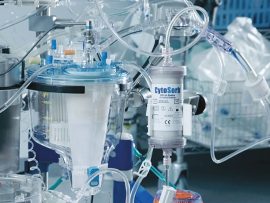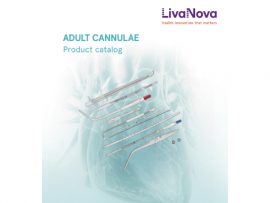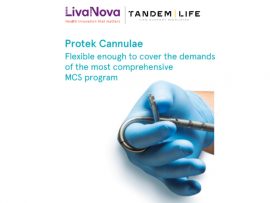Abstract Methemoglobinemia is a rare blood disorder that can have severe consequences if not promptly diagnosed and treated. In this article, we will explore a real-life case study of a..
Lire la suiteAbstract Rationale Severe cases of acute respiratory distress syndrome (ARDS) may require prolonged (>28 days) extracorporeal membrane oxygenation (ECMO). In non-resolving disease, recovery is uncertain and lung transplant may be..
Lire la suiteAbstract Objectives Colloids are added to the priming solution of the cardiopulmonary bypass (CPB) pump to maintain colloid osmotic pressure and prevent fluid overload. This study aimed to compare the..
Lire la suiteAbstract Cardiogenic shock is a complex and diverse pathological condition characterized by reduced myocardial contractility. The goal of treatment of cardiogenic shock is to improve abnormal hemodynamics and maintain adequate..
Lire la suiteAbstract Introduction: Cardiopulmonary bypass (CPB) is a vital component of many cardiac surgeries, but it can trigger systemic inflammatory responses, leading to post-operative complications. The CytoSorb filter, a cytokine adsorber, has..
Lire la suiteAbstract Background After pediatric cardiosurgical interventions, postoperative delirium can occur, which can be associated with undesirable consequences during and after the hospital stay. It is therefore important to avoid any..
Lire la suiteAbstract Objectives To study the quantitative potency of plasma albumin on cardioprotection in terms of creatinine kinase-myocardial band mass (CK-MBm) in on-pump cardiac surgery. Design Post hoc analysis of a..
Lire la suiteAbstract The term “cold agglutinin (CA)” refers to a group of disorders caused by anti-erythrocyte autoantibodies that preferentially bind RBCs at cold temperatures (4°C–18°C). CAs contribute to 10 to 15%..
Lire la suiteAbstract Background Heparin rebound is a common observed phenomenon after cardiac surgery with CPB and is associated with increased postoperative blood loss. However, the administration of extra protamine may lead..
Lire la suiteAbstract This case report describes a prehospital extracorporeal cardiopulmonary resuscitation (ECPR) in a female patient who suffered a sudden cardiac arrest while shopping in a supermarket. The success of this..
Lire la suiteAbstract Patient blood management is a patient-centered evidence-based approach to improve patient outcomes by harnessing the patient's own hematopoietic system to optimize blood health while promoting patient safety and empowerment...
Lire la suiteAbstract Background Patients with valvular heart disease require and cardiac arrest. Here, we test the hypothesis that exosomal hemoglobin formed during mediates acute cardiac injury in humans and in an animal model..
Lire la suiteAbstract Although surgical techniques and perioperative care have made significant advances, perioperative mortality in cardiac surgery remains relatively high. Single- or multiple-organ failure remains the leading cause of postoperative mortality...
Lire la suiteAbstract Introduction In children with myocarditis or dilated cardiomyopathy (DCM) on extracorporeal membrane oxygenation (ECMO) for cardiogenic shock, it is often necessary to decompress the left heart to minimize distension..
Lire la suiteAbstract Acute kidney injury (AKI) is a common complication in cardiac surgery patients, with a reported incidence of 20 to 30%. The development of AKI is associated with worse short-..
Lire la suiteOBJECTIVES Cardiopulmonary bypass (CPB) management may potentially play a role in the development of new-onset atrial fibrillation (AF) after cardiac surgery. The aim of this study was to explore this..
Lire la suiteAbstract Monitoring the patient receiving veno-venous extracorporeal membrane oxygenation (VV ECMO) is challenging due to the complex physiological interplay between native and membrane lung. Understanding these interactions is essential to..
Lire la suiteAbstract Objective To identify and compare the rates of cannula-associated (CaDVT) on venovenous (VV-ECMO) who receive systemic (AC) and those who do not receive AC. Design Retrospective observational study. Setting Tertiary academic medical center...
Lire la suiteAbstract Background and Objectives: Minimally invasive cardiac surgery (MICS) has been developing since 1996. Peripheral cannulation is required to perform MICS, and good venous drainage and a bloodless field are..
Lire la suiteAbstract Background The association between tissue oxygenation with postoperative acute kidney injury (AKI) in adult patients undergoing multiple valve surgery has not been specifically studied. Methods In this prospective exploratory..
Lire la suiteAbstract Valve-in-valve (ViV) (ViV-TAVI) with failed bioprostheses arose as an alternative to redo surgical (SAVR). To evaluate all-cause mortality in ViV-TAVI versus redo-SAVR, we performed a study-level meta-analysis of reconstructed time-to-event data from..
Lire la suiteAbstract Background Veno-arterial Extracorporeal Membrane Oxygenation (VA-ECMO) is a rescue treatment in refractory cardiogenic shock (CS) or refractory cardiac arrest (CA). Exposure to hyperoxemia is common during VA-ECMO, and its..
Lire la suiteExtracorporeal membrane oxygenation in diabetic ketoacidosis-related cardiac and respiratory failure
Abstract Introduction: Diabetic ketoacidosis (DKA) is a common clinical problem. When patients develop severe shock and/or respiratory failure, extracorporeal membrane oxygenation (ECMO) may be considered. This case series describes the..
Lire la suiteAbstract Objective Strategies for red blood cell (RBC) transfusion in patients undergoing cardiac surgery have been traditionally anchored to hemoglobin (Hb) targets. A more physiologic approach would consider markers of..
Lire la suiteAbstract Background The Society for Cardiovascular and Interventions (SCAI) classification has been shown to provide robust mortality in a variety of cardiovascular patients. Objectives This study sought to evaluate the SCAI classification in postoperative..
Lire la suiteAbstract Importance: Skin pigmentation influences peripheral oxygen saturation (SpO2) measured by pulse oximetry compared to the arterial saturation of oxygen (SaO2) measured via arterial blood gas analysis. However, data on..
Lire la suiteAbstract Antegrade cardioplegia is routinely given during cardiac surgery. The delivery of antegrade cardioplegia from the cardiopulmonary bypass machine has many variables. Many perfusionists rely exclusively on cardioplegia system pressure..
Lire la suiteAbstract Objective To evaluate and synthesise the factors determining patient safety culture in hospitals. Methods The scoping review protocol was based on the criteria of the Joanna Briggs Institute. Eligibility criteria were..
Lire la suiteAbstract OBJECTIVES: This review aims to: 1) identify the key circuit and patient factors affecting systemic oxygenation, 2) summarize the literature reporting the association between hyperoxia and patient outcomes, and..
Lire la suiteAbstract Objectives We aimed to evaluate thrombotic and hemorrhagic complications with heparin versus bivalirudin use in veno-venous extracorporeal membrane oxygenation (V-V ECMO). Methods We performed a retrospective cohort study of..
Lire la suite














